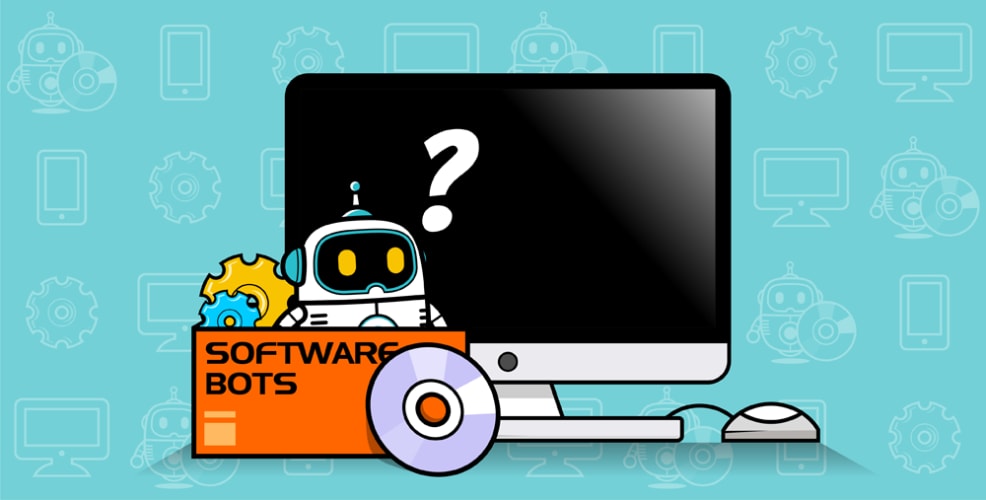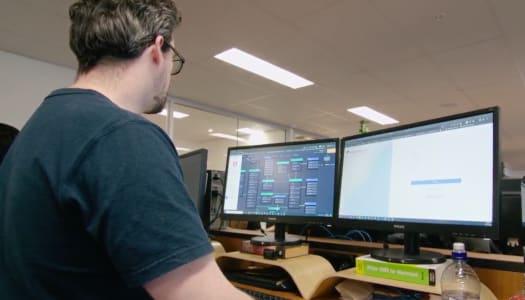Artificial Intelligence (AI) is no longer a distant fantasy. It's here. Now!
Just last week, Google DeepMind's deep learning AI, AlphaGo, crushed the world's top-ranked Go player, Ke Jie, 3-0 in a much-anticipated exhibition match at the Future of Go Summit (May 23-27).
And AI can do a whole lot more than play board games and go on TV game shows, there's now an entire ecosystem of bots, including chatbots, crawlers and transactional bots. And as more time and money is spent on software bot development, these bots are going to become smarter and faster, not to mention more diversely skilled.
So, what can these AI programs, commonly known as bots, actually do? And what are the things we should know about them?
1. What Are Software Bots?
All programs operate in three stages (input-processing-output), bot software are programs that have a degree of autonomy during the processing stage and a less limited range during the input and output stages, thanks to that boost in processing capabilities. Basically, AI is automation and this automation allows programs to communicate across a wider range of mediums, such as speaking in natural language (e.g. Siri).
Bots are the software equivalents of robots: automated machines and automated bot software. What tasks they can attempt, let alone accomplish, is wide-ranging, and varies AI to AI.
For example, AlphaGo and IBM's Watson are superhuman at the board game ‘Go' and the game show ‘Jeopardy!' respectively, but neither can chat with you like a chatbot can. And while chatbots can chat, they can't critique the latest Hollywood blockbuster, or do what AlphaGo and Watson can.
AlphaGo, Watson and chatbots (including advanced ones like Siri) are Weak AI.
Weak (Narrow) AI
A bot like AlphaGo is what is called Weak AI. But why? Isn't AlphaGo the best player at what's considered the most complicated 2-player board game? Yes and yes, But while AlphaGo can play Go, it can't play other board games, such as Chess. Its abilities are 'narrow' in contrast to its human opponents, who can also see, hear, taste, smell, touch, speak and much more.
Ergo: Weak AI.
A Weak AI an AI that's non-sentient and only capable of a narrow range of tasks, however, it can be very competent at these tasks.
The theoretical alternative to Weak AI is Strong AI.
Strong (Deep) AI
A strong AI is an AI capable of a wide range of tasks.
It's believed that a Strong AI would be conscious (or the machine equivalent).
Humans have not yet been able to create a Strong AI. However, some Weak AIs are much 'stronger' than others (e.g. Watson could understand verbal questions (involving wordplay) on topics as varied as literature and sports, and provide verbal answers phrased as questions (this is how answers are provided in Jeopardy!).
Another approach to categorising software bots is by 'intelligence'.
ANI, AGI and ASI
Artificial Narrow Intelligence (ANI) is essentially Weak AI; when the machine's intelligence is isolated to a narrow range of parameters and contexts. All existing AI are ANI.
Artificial General Intelligence (AGI) is much the same as Strong AI, but with stronger parallels to human intelligence, which is general intelligence. An AGI would be able to do everything a human can do: play board games and go on TV games shows, chat, discuss movies, read books and learn, be moral, etc.
Artificial Super Intelligence (ASI) is something we can only speculate about. Such an AI would surpass all humans at all things: maths, writing books about Orcs & Hobbits, prescribing medicine and much, much more.
Even optimistic experts believe AGI, let alone ASI, is decades down the line. Perhaps even centuries. We really don't know, and can only speculate as to what an AGI or ASI would be like.
As we can see, software bots exist in a complicated ecosystem. The weakest of Weak AI are little more than ordinary programs and the strongest of Strong AI would be an ASI, and extraordinary.
2. What Can Bots Do?
Presently, AlphaGo plays Go, but soon Deepmind's AI may be reshaping the healthcare industry alongside Watson (cancer treatment). And then there's Codebots.
Codebots is a program that creates other programs; code that writes code.
In software development, teams of developers, designers and project managers begin building a web or mobile application by mapping out what the application will be. This includes writing a requirements backlog.
Previously, they would then use these plans as a guide when making the program. Now they can use Codebots to translate diagrams and models into code.
The core problem is that although applications vary in the details, there are many shared artefacts that developers are required to repeatedly re-create or adapt and implement on an app to app basis. Codebots can read and understand the high-level plans all app development necessarily begins with, and is able to write most of the code needed to bring these plans into reality in mere minutes. On average, Codebots writes 92.68% of the required backend code.
With software bots helping with tedious tasks, human creativity has more space to thrive. Using Codebots, developers, designers, and other users are empowered to create awesome product and service solutions (and in less time!).
In cases like Codebots, the bots are like sidekicks, with creative humans still the heroes. This is also how many businesses think of chatbots, which are amazing tools to have in your business' sales and customer service toolkits, while also being "a minefield of mismatched expectations".
Bots can write music, draw landscapes, play Go, write code and more! And this list will expand. The software development process is one where time, money and incremental improvement creates massive change. What can software bots do? Time will tell. Now is an ideas boom for AI research.
Read our Jidoka Process to find out how Codebots has evolved the software development process.
3. Are Bots Going to Take Over the World?
In his book Superintelligence, Nick Bostrom begins with The Unfinished Fable of the Sparrows.
Once upon a time a group of sparrows decided that it would be nice if they had a big, strong owl to help them do sparrow things. When one sceptical sparrow voiced his concerns over how they, lowly sparrows, could possibly control an owl, another sparrow replied:
"Taming an owl sounds like an exceeding difficult thing to do. It will be difficult enough to find an owl egg. So let us start there. After we have succeeded in raising an owl, then we can think about taking on this other challenge."
And with that, most of the sparrows went off in search of an owl. The remaining sparrows soon realised that learning how to tame an owl wasn't easy, in no small part because they had no owls to practice on. But they pressed on as best they could because, at any moment, "the flock might return with an owl egg before a solution to the control problem had been found."
Humans are the sparrows, in Bostrom's metaphor, and ASI is the owl. As it was for the sparrows, the "control problem" is especially challenging because we may only get one chance at solving it. This is because once an unfriendly superintelligence emerges, it will presumably stymie any attempt we make at stopping it or changing its preferences (e.g. the Terminator series' Skynet). (That's why our own Codebots technology can only create and edit eternal code, and not its own, internal code.)
But should we be worried about AI taking over the world?
Well, it depends. Bots may be beating us at board games and TV game shows, but software bot businesses still have a long way to go in developing AGI, let alone ASI.
Even emerging technologies like Codebots require human pilots.
Still worried?
Your brain is an immense network of about 100 billion neurons connected by around 100 trillion synapses. You have hundreds of trillions of neural pathways in your head. No computer in the world today comes close to matching your brain's horsepower.
The Fujitsu-built K, one of the world's fastest supercomputers, is capable of 8 quadrillion calculations per second, and it took 40 minutes to simulate a second of neural activity!
Skynet isn't even remotely possible with today's technology. So no, even the most leading edge bots are not going to take over the world, but they may take your job.
4. Are Bots Going to Take My Job?
Many industries are currently being disrupted by emerging AI technologies, and many more may soon be.
According to PricewaterhouseCoopers, 38% of US jobs could be automated by the early 2030s, with similar percentages expected in Germany (35%) and the UK (30%).
The threat of automation is highest in the transportation and storage (56%), manufacturing (46%) and wholesale & retail (44%) sectors, and lower in health and social work (17%).
Workers with undergraduate and postgraduate degrees have a much lower risk of being automated.
But it's not all doom and gloom. Fresh development into AI and new automation technologies are expected to create new industries and revitalise others.
Summary
When it comes to the AI programs commonly known as bots, there's a lot to know. For one, bots exist in a complicated ecosystem, with the weakest of Weak AI being little more than ordinary programs, while the strongest of Strong AI are ASI, and truly extraordinary.
This ecosystem is further muddled by bots such as Siri, which are more a collection of separate AI processes than a single coherent unit.
And then there's the threat posed by these machines. Automation could see human workers replaced by robots and bots across a diverse spectrum of sectors and industries (luckily something like Skynet isn't even remotely on the horizon).
What's clear is that the robots are rising, and we had best understand what software bots are if we are to make our way in this new, interesting world.
Read our Jidoka Process 'Automation with a human touch'
Contact us here to discuss your software project further.





